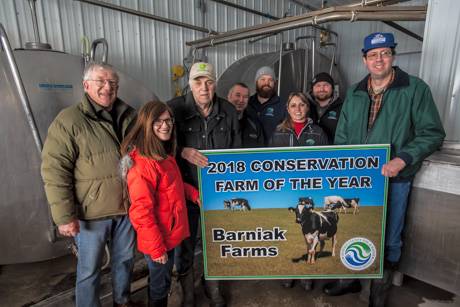Announced today: 2017 U.S. Census of Agriculture data is now available
Press release:
(WASHINGTON, D.C., April 11) – The U.S. Department of Agriculture (USDA) today announced the results of the 2017 Census of Agriculture, spanning some 6.4 million new points of information about America’s farms and ranches and those who operate them, including new data about on-farm decision making, down to the county level.
Results are available in many online formats including video presentations, a new data query interface, maps, and traditional data tables.
***All information is available here.***
To address questions about the 2017 Census of Agriculture data, NASS will host a live Twitter chat (@usda_nass)
Ask the Census Experts #StatChat on Friday, April 12 at 1 p.m. ET.
Information collected by USDA’s National Agricultural Statistics Service (NASS) directly from farmers and ranchers tells us both farm numbers and land in farms have ongoing small percentage declines since the last Census in 2012. At the same time, there continue to be more of the largest and smallest operations and fewer middle-sized farms. The average age of all farmers and ranchers continues to rise.
“We are pleased to deliver Census of Agriculture results to America, and especially to the farmers and ranchers who participated,” said U.S. Secretary of Agriculture Sonny Perdue. “We can all use the Census to tell the tremendous story of U.S. agriculture and how it is changing.
"As a data-driven organization, we are eager to dig in to this wealth of information to advance our goals of supporting farmers and ranchers, facilitating rural prosperity, and strengthening stewardship of private lands efficiently, effectively, and with integrity.”
“The Census shows new data that can be compared to previous censuses for insights into agricultural trends and changes down to the county level,” said NASS Administrator Hubert Hamer.
“While the current picture shows a consistent trend in the structure of U.S. agriculture, there are some ups and downs since the last Census as well as first-time data on topics such as military status and on-farm decision making.
"To make it easier to delve into the data, we are pleased to make the results available in many online formats including a new data query interface, as well as traditional data tables.”
Census data provide valuable insights into demographics, economics, land and activities on U.S. farms and ranches. Some key highlights include:
- There are 2.04 million farms and ranches (down 3.2 percent from 2012) with an average size of 441 acres (up 1.6 percent) on 900 million acres (down 1.6 percent).
- The 273,000 smallest (1-9 acres) farms make up 0.1 percent of all farmland while the 85,127 largest (2,000 or more acres) farms make up 58 percent of farmland.
- Just 105,453 farms produced 75 percent of all sales in 2017, down from 119,908 in 2012.
- Of the 2.04 million farms and ranches, the 76,865 making $1 million or more in 2017 represent just over 2/3 of the $389 billion in total value of production while the 1.56 million operations making under $50,000 represent just 2.9 percent.
- Farm expenses are $326 billion with feed, livestock purchased, hired labor, fertilizer and cash rents topping the list of farm expenses in 2017.
- Average farm income is $43,053. A total of 43.6 percent of farms had positive net cash farm income in 2017.
- Ninety-six percent of farms and ranches are family owned.
- Farms with Internet access rose from 69.6 percent in 2012 to 75.4 percent in 2017.
- A total of 133,176 farms and ranches use renewable energy producing systems, more than double the 57,299 in 2012.
- In 2017, 130,056 farms sold directly to consumers, with sales of $2.8 billion.
- Sales to retail outlets, institutions and food hubs by 28,958 operations are valued at $9 billion.
For the 2017 Census of Agriculture, NASS changed the demographic questions to better represent the roles of all persons involved in on-farm decision making. As a result, in 2017 the number of producers is up by nearly 7 percent to 3.4 million, because more farms reported multiple producers. Most of these newly identified producers are female. While the number of male producers fell 1.7 percent to 2.17 million from 2012 to 2017, the number of female producers increased by nearly 27 percent to 1.23 million. This change underscores the effectiveness of the questionnaire changes.
Other demographic highlights include:
- The average age of all producers is 57.5, up 1.2 years from 2012.
- The number of producers who have served in the military is 370,619, or 11 percent of all. They are older than the average at 67.9.
- There are 321,261 young producers age 35 or less on 240,141 farms. Farms with young producers making decisions tend to be larger than average in both acres and sales.
- More than any other age group, young producers make decisions regarding livestock, though the difference is slight.
- One in four producers is a beginning farmer with 10 or fewer years of experience and an average age of 46.3. Farms with new or beginning producers making decisions tend to be smaller than average in both acres and value of production.
- Thirty-six percent of all producers are female and 56 percent of all farms have at least one female decision maker. Farms with female producers making decisions tend to be smaller than average in both acres and value of production.
- Female producers are most heavily engaged in the day-to-day decisions along with record keeping and financial management.
The Census tells the story of American agriculture and is an important part of our history. First conducted in 1840 in conjunction with the decennial Census, the Census of Agriculture accounts for all U.S. farms and ranches and the people who operate them. After 1920, the Census happened every four to five years. By 1982, it was regularly conducted once every five years.
Today, NASS sends questionnaires to nearly 3 million potential U.S. farms and ranches. Nearly 25 percent of those who responded did so online. Conducted since 1997 by USDA NASS – the federal statistical agency responsible for producing official data about U.S. agriculture – it remains the only source of comprehensive agricultural data for every state and county in the nation and is invaluable for planning the future.


